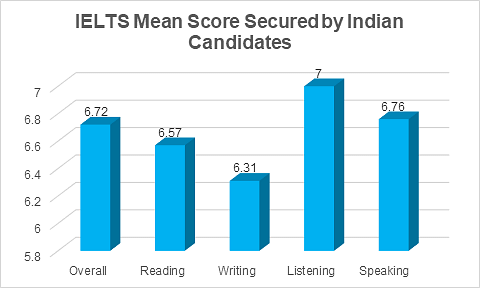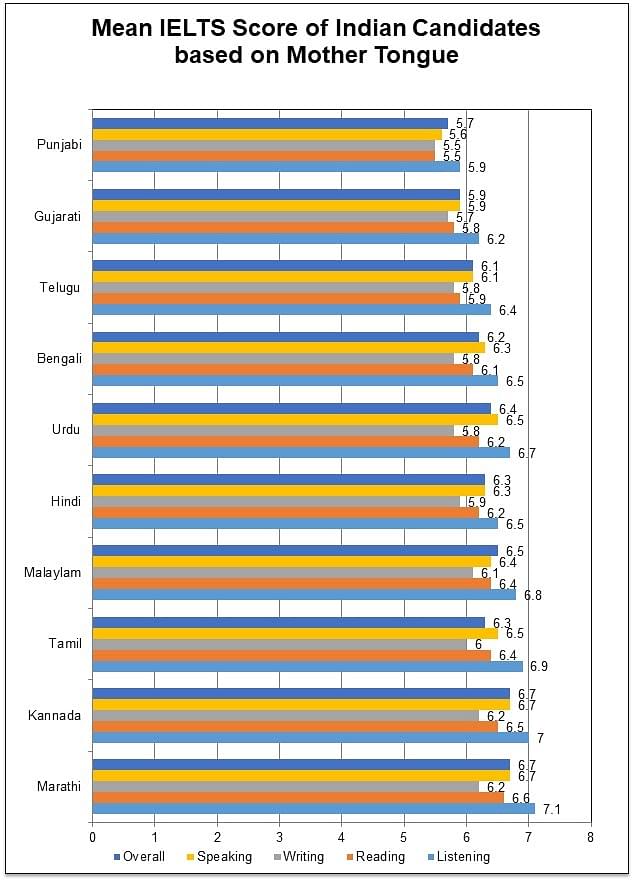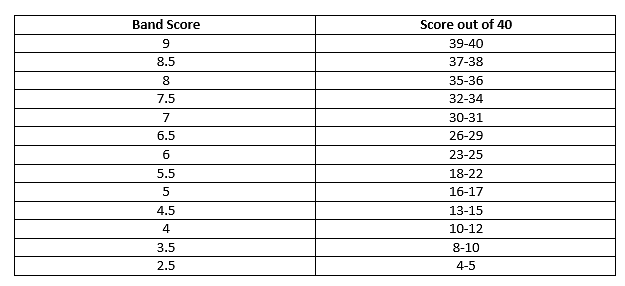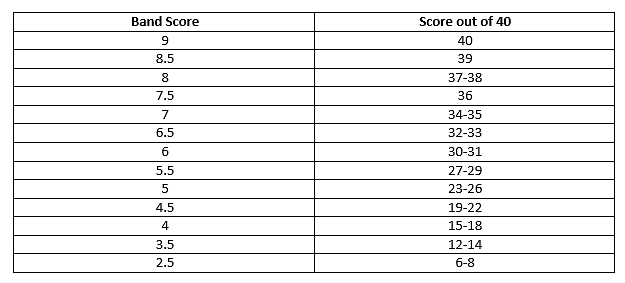IELTS scores are scaled on a scale of 0-9. IELTS uses a 9 band scale for four sections: Listening, Writing, Reading, and Speaking. Overall IELTS Band score is calculated on the average score secured in four components.
Check: Get IELTS Coaching Centers
The band score of IELTS is rounded to the closest half band or the whole band. If the average band score comes down to 0.25 then the overall IELTS band score will be converted to the nearest half band and if the overall band score of IELTS comes down to 0.75 then the score will be converted to the nearest whole number.
|
Table of Contents
|
IELTS Band Score in India
As IELTS is an exam meant for the candidates of non-English speaking countries who are willing to study in English-speaking countries, India has a dominant number of IELTS test-takers.


IELTS Band Scores Calculation
IELTS band score is calculated in a complex way: each section of IELTS has a raw score. The raw score of each section is based on the number of questions and the obtained IETLS raw score is the number of correct answers given.
IELTS Listening Score
In IELTS listening section, candidates get 40 questions each. Each question carries 1 point, which makes the raw IELTS listening scores. The IELTS listening scores are calculated using the table mentioned below

IELTS General Reading Score
IELTS general reading contains 40 questions and the IELTS general reading score can be calculated by following the below table

IELTS Academic Reading Score
IELTS academic reading contains 40 questions. IELTS general reading is comparatively easier than IELTS academic reading. The approximate band score of IELTS reading is obtained out of 40 and is converted in a 9-band scale to get the scaled score of these sections. For example, a candidate has secured 34 out of 40 in IELTS reading – to understand the scaled score, the candidates have to find out the equivalent of 34 in terms of 9. The process is (34/40)*9= 7.65. This is how IELTS reading is calculated.
IELTS Writing Score
Candidates have two tasks to attempt two tasks. IELTS writing score is given based on 4 marking criteria:
- Task Achievement (for Task 1) or Task Response (for Task 2)
- Coherence and Cohesion
- Lexical Resource
- Grammatical Range and Accuracy
IELTS writing score can be determined by following different criteria as described in the table

IELTS Speaking Score
IELTS speaking section is conducted either on the same day or within a week after taking the test. IELTS speaking score is given based on 4 marking criteria:
- Fluency and Coherence
- Lexical Resource
- Grammatical Range
- Accuracy and Pronunciation
Based on these, the examiners award a score out of 9 for IELTS writing and speaking by equally evaluating each criterion.
The overall IELTS band score is calculated by extracting the average of the scores obtained in the individual sections and rounding it off to the nearest whole digit or half. For example, a candidate has obtained 6.5 for Listening, 6.5 for Reading, 5.0 for Writing, and 7.0 for Speaking. The overall score will be the total score by adding the score of 4 sections and dividing them by for.
Here the total is (6.5 + 6.5 + 5 + 7) = 25 which makes the average 25/4 = 6.25. In this case, the overall IELTS band score will be 6.5 considering it is the nearest half. IELTS band score has to be a whole number of a digit with .5. Anything other than these will be rounded off to the nearest full or half.
IELTS Score Validity
IELTS score comes with validity for 2 years. After this period, the candidates will not be able to send an IELTS score to any university or organization, no matter how high band score they have secured. That’s why we recommend the candidates to apply wherever they want within its validity.
IELTS Band Score Description
The meaning of each point of the IELTS band scale is mentioned in the table below:
| IELTS Band Score | Explanation |
|---|---|
| 9 or Expert | Complete understanding of English with fluency and accuracy. |
| 8 or Very good | Good understanding of English with complex and detailed argumentation. Occasional inaccuracies in unfamiliar situations. |
| 7 or Good | Excellent use of the language in certain situations. |
| 6 or Competent | The candidate has shown effective usage of English with some inaccuracy. |
| 5 or Modest | Test-taker can handle can communicate in English in familiar circumstances well with partial command over it and ample mistakes. |
| 4 or Limited | The candidate does not understand complex language; they can manage basics under very familiar situations. |
| 3 or Extremely limited | Test-taker has a rudimentary knowledge of the language to convey only the general meaning. |
| 2 or Intermittent | The candidate has difficulty in understanding spoken and written English. |
| 1 or Non-user | The test-taker has limited knowledge of the language with a few random isolated words. |
| 0 or Did not attempt | Test-taker was unable to answer any questions. |
Even after being a difficult exam, it is possible to secure a good IELTS band score with proper practice. The candidates can check the IELTS solved papers of writing for this purpose. As it is a difficult exam and it has a time limit for each of the sections, it is good for the candidates to use the smart preparation tips for IELTS to answer the questions correctly and quickly. Along with regular practice with IELTS papers, sincerity and confidence are the USPs to ace IELTS.


